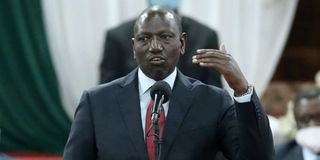Ombudsman for Judiciary not a big deal

Deputy President William Ruto during the launch of the Building Bridges Initiative report at Bomas of Kenya in Nairobi on October 26, 2020.
What you need to know:
- Once the nominee is vetted and approved by Parliament, the President will formally appoint him to the Judicial Service Commission
Deputy President William Ruto set the ball rolling at the launch of the Building Bridges Initiative (BBI) report at the Bomas of Kenya.
He raised a red flag on a number of the proposals, including threat on the appointment of the Judiciary Ombudsman.
You want Parliament and Executive to be involved in creating and appointing the head of this office? Wouldn’t that amount to interfering with the independence of the Judiciary?
A few days later, the National Council of Churches of Kenya (NCCK) echoed the DP’s sentiments. The umbrella body for protestant churches opposed the proposal and called for a review of the report. Let this office continue to be under the armpit of the Chief Justice, said the clerics, or they reject BBI at the referendum.
I disagree with this thinking. First, my understanding is that the main role of the Office of the Ombudsman is to protect public interest. But, despite having one, in the name of Commission on Administrative Justice (CAJ), we have a pile of complaints against rogue judicial officers, as well as all manner of cases against top judges in court amid claims of plots to scatter them.
Expose misdeeds
Allowing the CJ to appoint the Ombudsman means the officer’s job is not secured. Being answerable to the appointing authority, would one expect him to expose misdeeds by the Bench?
I fully support the BBI recommendation that the office of Ombudsman no longer be created through internal mechanisms of the Judiciary. Once the nominee is vetted and approved by Parliament, the President will formally appoint him to the Judicial Service Commission (JSC).
While the three arms of the government – Executive, Legislature and Judiciary – are independent, the law requires them to embrace an inter-dependent working relationship. Besides, in the 11-member JSC, the President has only two slots yet the buck stops with him. You would not expect him to act when his hands are tied.




